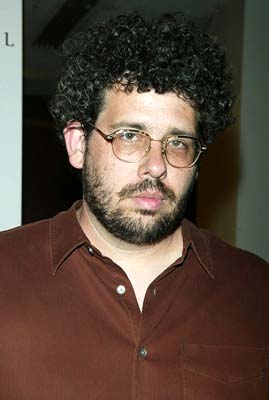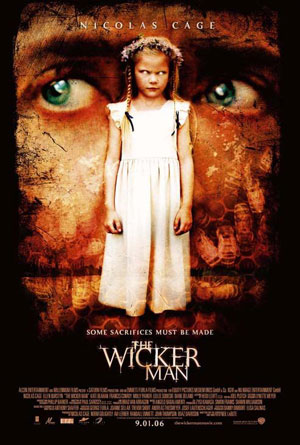 It was pretty weird seeing Neil LaBute [Nick’s interview from 2003] at Comic Con. I got the impression that he felt just as weird being there. He showed up to talk about his Wicker Man remake, and to show the first few minutes of the movie, which does a twist on the old “guy getting smashed by a speeding vehicle that suddenly comes from out of frame” gag. After the panel, LaBute came upstairs to do some press, and I was lucky enough to get one on one time with him.
It was pretty weird seeing Neil LaBute [Nick’s interview from 2003] at Comic Con. I got the impression that he felt just as weird being there. He showed up to talk about his Wicker Man remake, and to show the first few minutes of the movie, which does a twist on the old “guy getting smashed by a speeding vehicle that suddenly comes from out of frame” gag. After the panel, LaBute came upstairs to do some press, and I was lucky enough to get one on one time with him.
It’s possible that you don’t know who LaBute is – this could be the case if you’re reading CHUD for the first time today. Get to know him, since he’s one of the best writer/directors out there. His film In the Company of Men is searing, a horrifying story of two bored salesmen who decide to toy with and destroy a pretty, shy young deaf girl. Your Friends and Neighbors is filled with shattering moments like the playful discussion about raping a boy in high school. Even Nurse Betty, his “light” movie, has way more heavy stuff going on it than your average comedy.
The man’s track record means that his Wicker Man remake is a must-see. And after doing this interview my excitement level has kicked up a couple of notches. Warning – spoilers follow in this intro, as well as in the interview. If you have not seen the original Wicker Man, or don’t know the famous ending of that film, just stop reading now. Have you stopped? Good. Knowing that LaBute kept a variation on the original ending makes the whole film much more intriguing. And while he’s kept the basic ending (I get the feeling Cage meets his maker in a different way this time around), he has changed many other things, including the nature of the threat – in LaBute’s version there’s a pagan matriarchy, and instead of apples, they raise bees. It sounds like a genuinely fresh take on the material.
Wicker Man is due out in September.
Q: What is the appeal of moving into this genre for you? Most of your films have been very serious “dramas.”
LaBute: Ultimately though this is deadly serious business. In this genre you get people in life or death situations, sometimes even moreso than in drama. I think that you can see the kind of actors – Hilary Swank [in The Reaping], Nicolas Cage in this movie – there isn’t a top flight actor today that isn’t interested in this kind of movie. I think Naomi Watts is doing Funny Games, which is certainly a horror movie, albeit psychological. I think it’s an attractive genre because it pushes people to extremes. I’m interested in that, in how people respond to power and extremes. I’ve had some of my earlier films called horror movies because they were scary relationship movies. So to actually go into that genre and take something that… albeit it’s an uncomfortable fit into horror. It’s not your quintessential – I don’t think someone would hold this up if they were trying to explain what horror movies are. It doesn’t have a monster, it doesn’t have a killer, it doesn’t have a lot of darkness. It doesn’t have a lot of things the genre – I don’t want to say requires, but often uses – in aiding the process of frightening somebody.
That was attractive to me. How do I make a movie like that frightening? How do I make it work? And also in the way that I wanted to tell it, it dealt with a lot of the concerns that had been in writing of mine before.
Q: About men and women.
LaBute: About how men and women interact and the idea that if women were in control things would be so much better. If you look at power dynamics, if too much power is given to any one individual or community the dynamic shifts into a dangerous balance. This afforded me the opportunity to do something that was within the confines of one genre but also take it to a place that people see less of in that genre.
any one individual or community the dynamic shifts into a dangerous balance. This afforded me the opportunity to do something that was within the confines of one genre but also take it to a place that people see less of in that genre.
Q: You don’t have a problem ending your movies on a difficult note. In the Company of Men has a devastating final couple of minutes. However you’re making a mainstream film here for a big studio based on a movie where the main character is burned to death at the end. Without giving away how you handled the end, did the studio come to you saying, ‘You’re not going to kill Nic Cage, right?’
LaBute: The movie was made independently and is coming out through Warner Bros, but a financier is always interested in how that movie is going to play, which translates into dollars. Certainly there was talk about, ‘Now I know how the first one ends, but what’s going on here? You’ve written it as such.’ But that always remained a priority to us, that we were going to be true to the dynamics of the original. The character gets himself into a terrible place and there’s not really a way out. I think you’ll be satisfied in one way. But that doesn’t mean all audiences will be satisfied. They don’t want to see their stars killed. They don’t want to be left with some uncertain morality dumped in their lap. Will that work with everybody? I don’t know. But it’s more important to me to be true to the story than to the audience’s expectations. I think people who come into this knowing the picture – the original – will be satisfied. And I hope the people who don’t will be satisfied because it makes sense. This is how this thing should end. That’s tricky business, I’ll agree, but we were lucky to have people – and not just myself – people in producorial positions and with as much power as Nic has to be able to say, ‘Look, this is the movie. I’m not going off in the end with guns in hand, coming out of the ashes with bullets flying. That’s not happening.’ So thank God for that. He’s certainly made both kinds of movies and he’s very true to the spirit of this one.
Q: I am intrigued by the idea that in movies you’re not supposed to do remakes. Everyone gets pissed off. But you also work in the theater, and there it’s just part of the business.
LaBute: That’s the thing. It’s far less difficult for me to imagine doing this because I’m so used to – just in my office yesterday we had a pile of international productions [of The Shape of Things] from all over the world. I’m looking at posters for Shape of Things in Belgium and Chile. Everybody has their own take on it. It’s not a big deal for me to say, ‘I’m taking this thing and I’m going to reimagine it my own way. I find it more difficult to figure out why someone would want to remake something really closely. If it made money I understand why, but artistically why would you say, ‘I just want to make that exact same movie’?
This one – certainly, the spirit of the thing is there, but it’s a very different journey. Because of that I didn’t go into it thinking, ‘Oh wow, I really shouldn’t remake the movie.’ There are probably movies I wouldn’t want to remake, but this certainly wasn’t one of them. As much as I enjoy it, there’s a lot that I find goofy. The songs… you’re like, ‘What is this?’ If you want to make a movie that’s less scary, put that song on there. And yet by the end you’re going, ‘What a weird fucking movie this is.’ I hope that when people walk away from this is that people go, ‘That’s unlike any movie I have seen in a long time.’ That’s what you hope for, I guess – some new take on already existing material.